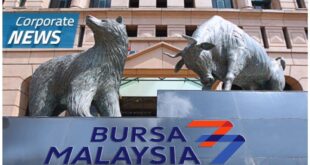BENGALURU: Wall Street’s main indices closed lower on Thursday after a US Treasury auction sent bond yields higher while investors were already digesting data that showed consumer prices rose more than anticipated in September.
Surging shelter costs pushed consumer prices higher last month while the annual increase in the core figure, excluding volatile food and energy components, was the smallest in two years.
After the data, the S&P 500 spent the morning zig-zagging between red and green. It turned decisively lower after a 1 p.m. EDT (1700 GMT) auction of 30-year US Treasuries met weak demand.
“The biggest overhang to the market the last two months has been the rise in interest rates. Any meaningful move one way or the other on any given day is going to have an impact on equities,” said Michael James, managing director of equity trading at Wedbush Securities in Los Angeles.
After Thursday’s auction “the magnitude of the move higher in rates caused a significant downward dislocation in equities across the board,” James added.
The Dow Jones Industrial Average fell 173.73 points, or 0.51%, to 33,631.14, the S&P 500 lost 27.34 points, or 0.62%, to 4,349.61 and the Nasdaq Composite dropped 85.46 points, or 0.63%, to 13,574.22.
US benchmark 10-year yields rose after the inflation data and climbed further to hit a session high after the auction. The benchmark yield rose as high as 4.728%, its highest-level since Friday after falling for the last two days.
Among the S&P 500’s 11 major industry sectors, the biggest decliner was materials, ending down 1.5%. The rise in yields particularly pressured rate-sensitive sectors such as utilities, down 1.5% and real estate down 1.3%, its second and third biggest decliners.
Homebuilding stocks fell after the data and came under more pressure after the afternoon increase in bond yields. The iShares Home Construction ETF ended down 4.62% for its biggest one-day percentage decline in almost a year.
The sole S&P sector gainers were information technology , up 0.1% and energy, up 0.09%.
Boston Fed President Susan Collins, who does not have a vote on the rate-setting Federal Open Market Committee (FOMC) this year, said on Wednesday that while the odds of the economy escaping a recession have grown, it is possible the central bank is not done with interest rate hikes aimed at bringing inflation back to its target.
Investors were also carefully monitoring developments in the Middle East. Gaza moved closer to a humanitarian catastrophe as the death toll rose and vital supplies ran low, while Israel massed tanks on the enclave’s border ahead of an anticipated ground invasion amid international calls for restraint.
Investor focus may soon shift to the earnings season on Friday, with big banks including JPMorgan Chase, Wells Fargo and Citigroup reporting their quarterly numbers before the market open.
Among individual stocks, Fastenal rallied 7.5% after the industrial supplies company beat third-quarter profit estimates.
Ford Motor fell 2% after the United Auto Workers (UAW) union expanded its strike at the company’s biggest and most profitable factory.
Declining issues outnumbered advancing ones on the NYSE by a 4.46-to-1 ratio; on Nasdaq, a 2.89-to-1 ratio favoured decliners.
The S&P 500 posted 17 new 52-week highs and 37 new lows; the Nasdaq Composite recorded 38 new highs and 322 new lows.
On US exchanges 10.91 billion shares changed hands compared with the 10.75 billion moving average for the last 20 sessions. — Reuters
 BeritaKini.biz Berita Viral Terkini di Malaysia
BeritaKini.biz Berita Viral Terkini di Malaysia





